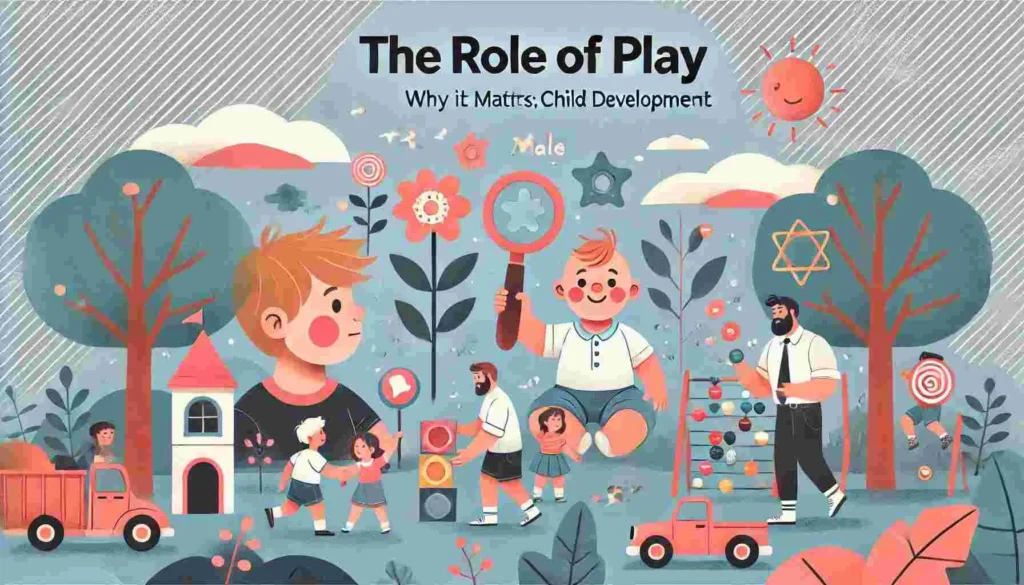
The Role of Play in Child Development: Why It Matters
Introduction: Understanding the Power of Play in Child Development
Play is often viewed as simply a fun, carefree activity for children, but it holds far more significance than that. It is a critical tool for cognitive, emotional, and social development, offering children opportunities to develop skills that will help them navigate the world as they grow. While academic achievement and structured learning are undeniably important, research has consistently shown that play is just as essential for a child’s growth. The role of play in child development extends beyond entertainment—it is a dynamic and vital force that shapes the way children learn, think, and interact with others.
Types of Play: A Multifaceted Tool for Development
Play is not a one-size-fits-all activity. It can take many forms, each contributing to various aspects of child development. Understanding the different types of play is crucial to appreciating how they contribute to a child’s overall growth.
- Physical Play: This includes activities that involve movement, such as running, climbing, and dancing. Physical play is critical for the development of motor skills, coordination, and strength. According to research by Pellegrini and Smith (1998), physical play helps in the development of gross motor skills, which are essential for overall health and well-being.
- Social Play: Social play occurs when children engage with peers or adults in a shared activity. These interactions promote social skills such as communication, cooperation, and conflict resolution. Play with peers fosters emotional regulation and empathy, crucial elements in building strong relationships. Studies show that children who engage in social play develop better communication skills and emotional intelligence (Rubin, Bukowski, & Laursen, 2011).
- Pretend Play (or Symbolic Play): Pretend play involves acting out scenarios and imagining oneself in different roles. This type of play stimulates creativity, imagination, and problem-solving. According to Vygotsky’s theory of cognitive development, pretend play allows children to explore social roles, practice language skills, and enhance their executive functioning (Vygotsky, 1978). Pretend play also lays the foundation for abstract thinking and cognitive flexibility.
- Constructive Play: This type of play includes building with blocks, drawing, and engaging in puzzles or games that require planning and organization. Constructive play helps develop spatial awareness, problem-solving skills, and cognitive flexibility. Through activities like building towers or completing puzzles, children learn about cause and effect, spatial relationships, and critical thinking.
Cognitive Development: Enhancing Problem-Solving and Memory Through Play
One of the most profound impacts of play on child development is on cognitive growth. Piaget, in his theory of cognitive development, emphasized the importance of hands-on experiences in fostering learning. Play provides children with opportunities to experiment, explore, and problem-solve, helping to develop essential cognitive skills.
For example, when children engage in pretend play, they create scenarios that involve solving problems, thinking critically, and managing complex interactions. A child playing “house” or “doctor” not only practices language skills but also develops cognitive flexibility and the ability to consider multiple perspectives. As they adopt different roles, children exercise their ability to think abstractly, move beyond their immediate environment, and practice social behaviors in different contexts (Ginsburg, 2007).
Additionally, play helps enhance memory and attention. Games that involve following directions or remembering sequences, such as “Simon Says” or “memory matching,” challenge a child’s ability to focus, remember information, and exercise patience. These games help improve working memory, which is essential for academic success later in life. The process of planning and completing a task through play also improves executive function, including decision-making, problem-solving, and impulse control (Diamond, 2013).
Emotional and Social Development: Building Emotional Intelligence Through Play
Play is a natural way for children to express their emotions and explore relationships with others. During play, children may encounter situations that mirror real-life experiences, such as sharing toys, resolving conflicts, and negotiating rules. These scenarios help children develop social and emotional skills that are necessary for forming healthy relationships later in life.
Social play, in particular, encourages collaboration, turn-taking, and empathy. As children engage with their peers, they learn how to navigate group dynamics, understand others’ perspectives, and manage emotions. This is especially important for emotional regulation—the ability to manage one’s emotions in response to different situations. Children who engage in social play are more likely to develop strong interpersonal skills, such as conflict resolution and empathy, which are critical for success in both school and life (Lillard et al., 2013).
Moreover, play provides children with an outlet for expressing their emotions in a safe and supportive environment. Through play, children can work through feelings of frustration, joy, sadness, or anger. For instance, playing with dolls or action figures can help children process emotions related to real-life situations, such as the arrival of a new sibling or a difficult experience at school. By acting out scenarios, children gain a sense of control over their emotions and learn strategies for dealing with them effectively.
In addition to fostering emotional intelligence, play can also help children develop resilience. When faced with challenges during play, children often learn to cope with failure, adapt to new situations, and try again. These experiences are essential for developing a growth mindset—the belief that abilities can be developed through effort and perseverance. According to Dweck (2006), children who engage in activities that involve trial and error, like play, are more likely to develop resilience and a positive attitude toward challenges.
Physical Development: The Role of Play in Motor Skills and Health
Physical play is crucial for the development of both fine and gross motor skills. Gross motor skills, such as running, jumping, and climbing, are essential for overall physical health and are particularly important during the early years of a child’s life. These skills are foundational for activities like sports, riding a bike, or even simply walking.
Studies have shown that physical play promotes brain development, particularly in areas related to motor control and coordination (Pica, 2011). Engaging in physical activities like running, jumping, or playing with balls not only strengthens muscles but also improves balance, flexibility, and coordination. These abilities are crucial for maintaining health throughout childhood and into adulthood.
Fine motor skills, which involve smaller movements like grasping, writing, and manipulating objects, are also developed through play. When children engage in activities like building with blocks, drawing, or crafting, they are refining their fine motor skills, which are necessary for tasks such as writing, typing, and using utensils.
Conclusion: The Lasting Impact of Play on Child Development
The role of play in child development cannot be overstated. From enhancing cognitive abilities to promoting emotional well-being and physical health, play is an essential activity for children at all stages of development. It helps them build the skills necessary to navigate the complexities of life and prepares them for academic, social, and emotional success. Play is not just a pastime—it’s a vital force in shaping a child’s growth and future potential.
References:
- Diamond, A. (2013). Executive functions. Annual Review of Psychology, 64, 135-168.
- Dweck, C. S. (2006). Mindset: The New Psychology of Success. New York: Random House.
- Ginsburg, K. R. (2007). The importance of play in promoting healthy child development and maintaining strong parent-child bonds. Pediatrics, 119(1), 182-191.
- Lillard, A. S., et al. (2013). The impact of pretend play on children’s development: A review of the evidence. Psychological Science, 24(2), 1-16.
- Pellegrini, A. D., & Smith, P. K. (1998). The development of play during childhood: Forms and possible functions. Child Psychology and Psychiatry Review, 3(2), 51-57.
- Piaget, J. (1952). The Origins of Intelligence in Children. New York: International Universities Press.
- Pica, R. (2011). The importance of physical play in early childhood development. Early Childhood Education Journal, 39(6), 1-9.
- Rubin, K. H., Bukowski, W. M., & Laursen, B. (2011). Handbook of Peer Interactions, Relationships, and Groups. New York: Guilford Press.
- Vygotsky, L. (1978). Mind in Society: The Development of Higher Psychological Processes. Cambridge: Harvard University Press.
Social Skills: Building Relationships Through Play
Play is a key factor in helping children build meaningful social skills. As they engage with their peers, children learn the essentials of communication, sharing, and cooperation. These interactions help children understand how to express themselves, listen to others, and resolve conflicts. For example, in group play, children negotiate rules, share resources, and sometimes face disagreements, which provide opportunities to practice patience and empathy.
When children engage in cooperative play, such as playing team sports or building something together, they learn how to collaborate toward a shared goal. These social interactions are crucial in teaching children how to function in a group, whether it’s in a classroom or in later life. As children develop these skills, they also grow more confident in their ability to form friendships and navigate complex social dynamics.
Additionally, the ability to engage in social play supports emotional regulation. By practicing social interactions through play, children learn how to manage their emotions in response to challenges. For example, if a child becomes frustrated when another child doesn’t share a toy, they are given the chance to explore how to manage that frustration constructively. This ability to regulate emotions while interacting with others builds a foundation for positive social relationships throughout life.
Pretend Play: Enhancing Creativity and Problem-Solving Skills
Pretend play, or symbolic play, is one of the most beneficial forms of play for cognitive development. During pretend play, children use their imagination to create scenarios and take on various roles, such as pretending to be a doctor or a teacher. These imaginative activities stimulate creativity and allow children to practice problem-solving in a fun and engaging way.
When children engage in pretend play, they are not just having fun—they are developing critical thinking skills. For instance, when playing “house,” a child might decide who will perform certain tasks or how to resolve a fictional problem. These types of scenarios encourage them to think creatively and understand cause and effect. As they develop these problem-solving skills, children become better equipped to handle challenges in real life.
In addition, pretend play supports emotional intelligence. As children act out various roles, they are able to explore different perspectives and empathize with others. For instance, pretending to be a parent allows a child to understand caregiving responsibilities, while pretending to be a teacher can help a child grasp the importance of nurturing and guiding others. This helps build emotional awareness and social skills, both of which are essential for later success in school and in life.
Physical Play: Promoting Health and Coordination
Physical play is another critical component of child development. Activities such as running, jumping, and climbing help children develop gross motor skills. These physical activities are not only fun but are also essential for overall physical health, helping children strengthen their muscles, improve balance, and enhance coordination.
Physical play has significant benefits for brain development as well. Engaging in physical activities stimulates the brain, improving cognitive functions such as memory, focus, and problem-solving. Studies have shown that children who engage in regular physical play exhibit stronger academic performance, particularly in subjects that require coordination, such as writing and math. This connection between physical activity and cognitive ability underscores the importance of active play in early childhood development (Diamond, 2013).
Additionally, physical play promotes mental well-being. Exercise has been shown to reduce stress and anxiety, and for children, engaging in physical play is an excellent way to release pent-up energy. It also provides a natural mood boost by increasing the production of endorphins, chemicals in the brain that help alleviate feelings of anxiety and stress. Regular physical activity during play helps children maintain a positive outlook on life, which can contribute to better mental health as they grow.
Play and Emotional Resilience
Play plays an important role in developing emotional resilience—the ability to cope with and adapt to adversity. During play, children are often faced with challenges, such as losing a game or managing a difficult situation with friends. These experiences give children the opportunity to practice coping strategies in a low-stakes environment, helping them develop emotional strength.
When children experience frustration or disappointment in a play setting, they are learning how to manage those feelings in a healthy way. They learn to take turns, deal with competition, and practice patience. This builds resilience, teaching children how to bounce back from setbacks and approach challenges with a positive mindset.
Emotional resilience is an essential life skill. Children who develop this resilience through play are better equipped to handle stress and adversity as they grow older. Whether it’s dealing with academic pressure, social challenges, or other life difficulties, children who engage in play are better prepared to navigate the ups and downs of life.
The Impact of Play on Lifelong Development
The benefits of play are not limited to childhood. The skills children develop through play continue to shape their lives as they grow older. From academic success to emotional well-being and social competence, play has a lasting impact on a child’s development. As children learn to problem-solve, build relationships, and manage their emotions, they are acquiring the tools they need to succeed in school, relationships, and adulthood.
Studies have shown that play-based learning helps children develop stronger academic abilities. Children who engage in imaginative play, cooperative play, and physical play are better able to grasp complex concepts, think critically, and apply what they have learned to real-world situations. Play is not just a break from learning—it is an integral part of the learning process itself. It fosters creativity, curiosity, and a love for learning, which are key to lifelong success.
Moreover, the social and emotional skills developed through play help children form positive relationships with others. Children who engage in play are more likely to develop strong communication skills, empathy, and the ability to navigate complex social situations. These skills are important not only for academic success but also for creating a fulfilling and healthy life as adults.
Play and Academic Success: A Clear Link
The connection between play and academic success is clear. Research has shown that play-based learning significantly enhances children’s academic abilities, particularly in literacy and numeracy. Through play, children develop language skills, mathematical reasoning, and cognitive flexibility—skills that are essential for academic achievement. Whether they are building with blocks, engaging in pretend play, or solving puzzles, children are developing cognitive skills that will help them succeed in school and beyond.
Play also encourages a growth mindset—a belief that abilities can be developed through effort and persistence. When children face challenges during play, they learn to overcome obstacles, try different strategies, and keep working toward their goals. This mindset is crucial for success in both academic and personal endeavors, as it encourages children to see challenges as opportunities for growth rather than as insurmountable obstacles.
The key to maximizing the benefits of play is to integrate it into children’s daily lives in a structured and meaningful way. Teachers, parents, and caregivers can encourage play that is both fun and educational, helping children develop the skills they need for success in all areas of life.
Conclusion: Play is an Investment in a Child’s Future
Play is much more than just a fun activity for children—it is a vital tool for their development. Through play, children develop cognitive, emotional, social, and physical skills that will serve them throughout their lives. Play builds the foundation for academic success, emotional well-being, and strong relationships, helping children grow into well-rounded, confident individuals. As we continue to understand the importance of play, it’s crucial to ensure that children have the time, space, and encouragement to play and learn in meaningful ways.
The long-term impact of play on a child’s development underscores the importance of providing opportunities for play in all its forms—whether physical, social, imaginative, or constructive. By prioritizing play, we give children the tools they need to thrive in an ever-changing world, setting them up for a lifetime of success and fulfillment.
References:
- Berk, L. E. (2013). Child Development (9th ed.). Pearson Education.
- Diamond, A. (2013). Executive functions. Annual Review of Psychology, 64, 135-168.
- Denham, S. A., et al. (2003). Emotional development and emotional regulation: Implications for early childhood education. Social Development, 12(2), 303-315.
- Pellegrini, A. D., & Smith, P. K. (1998). The development of play during childhood: Forms and possible functions. Child Psychology and Psychiatry Review, 3(2), 51-57.
- Rubin, K. H., Bukowski, W. M., & Laursen, B. (2011). Handbook of Peer Interactions, Relationships, and Groups. New York: Guilford Press.
Long-Term Benefits of Play: Preparing for Success
Play doesn’t only benefit children in the short term; it also helps to prepare them for lifelong success. The skills and experiences gained through play form the foundation for academic achievement, emotional resilience, and social competence, all of which contribute to a fulfilling life. Research has shown that play provides children with cognitive, emotional, and physical advantages that last long after childhood ends.
Cognitive Development: How Play Enhances Academic Success
Play is a powerful tool for cognitive development, particularly when it comes to academic success. Engaging in activities like problem-solving games, pretend play, or constructing with blocks helps children build critical thinking and reasoning skills. When children play, they actively engage their brains in decision-making, planning, and understanding complex concepts. These activities contribute directly to better performance in subjects like math, reading, and science.
For example, when children play with puzzles or build with blocks, they develop spatial awareness and problem-solving skills. These skills are crucial for subjects that require logic and abstract thinking, such as mathematics. Research has shown that children who engage in play-based learning tend to develop stronger executive functions, which are essential for tasks like managing multiple concepts, remembering information, and organizing thoughts (Diamond, 2013). These cognitive benefits from play can significantly improve academic outcomes in school.
Moreover, pretend play encourages creativity and abstract thinking. When children act out scenarios and take on roles, they not only explore the world but also practice thinking outside the box. These activities enhance their ability to think critically and approach problems from different angles, which are essential skills for academic and professional success.
Social and Emotional Skills: The Foundation for Healthy Relationships
Play is crucial in helping children develop social and emotional skills, which are vital for building healthy relationships later in life. Social play, whether in the form of cooperative games or group activities, teaches children how to communicate effectively, share, and work together toward a common goal. These interactions help children navigate group dynamics, resolve conflicts, and express themselves in socially appropriate ways.
During social play, children also learn empathy. For example, when children play games that involve taking turns or sharing toys, they practice understanding the feelings of others. They learn the importance of kindness and cooperation, which are key components of emotional intelligence. Furthermore, play allows children to practice handling both positive and negative emotions. If a child gets upset during a game, they learn how to manage their frustration and return to the activity in a more composed state.
As children learn to navigate social interactions through play, they develop strong interpersonal skills that help them throughout their lives. These skills are crucial for creating friendships, succeeding in school, and eventually working as part of teams in the professional world. Play fosters positive self-esteem as children see themselves succeed in social interactions and understand that their feelings are valid and important.
Physical Play: Supporting Physical and Mental Well-Being
Physical play is essential for promoting health and building motor skills. Engaging in activities like running, jumping, and climbing helps children strengthen their muscles, improve balance, and enhance coordination. Physical play is crucial for developing both gross and fine motor skills, which are necessary for everyday activities like walking, writing, and handling small objects.
In addition to physical health, play also supports mental well-being. Studies have shown that physical activity, such as playing sports or running around, helps children release endorphins, which are natural chemicals that improve mood and reduce stress. Regular physical play provides an outlet for children to expend energy, reducing feelings of frustration and anxiety. These benefits extend into adulthood, where the habit of physical activity nurtures lifelong mental health and resilience.
Building Emotional Resilience Through Play
One of the most important benefits of play is its role in building emotional resilience. During play, children encounter challenges such as losing a game, managing frustration, or dealing with conflict. These experiences teach children how to cope with adversity and bounce back from setbacks. For example, when a child loses in a game, they learn how to handle disappointment and keep trying.
Play also teaches children the importance of perseverance and self-control. In games that require strategy or cooperation, children learn how to plan, wait their turn, and work through difficulties. These skills help them become more resilient in everyday life. The emotional lessons learned through play are invaluable in helping children develop a positive mindset, manage stress, and adapt to new situations.
Play and Lifelong Learning
Play is not just about having fun—it’s a critical part of lifelong learning. The skills children develop through play, such as problem-solving, communication, and resilience, contribute to their ability to learn throughout their lives. Play-based learning creates a foundation for curiosity, engagement, and the love of learning, which can lead to success in various fields. Children who engage in play are more likely to enjoy learning and embrace challenges as opportunities for growth.
Moreover, the creativity and critical thinking fostered by play can enhance problem-solving abilities in adulthood. In fact, many successful adults credit their childhood play experiences for helping them develop the skills needed to think outside the box and approach challenges in innovative ways.
The Role of Play in Academic Achievement
As play helps develop cognitive and emotional skills, it also plays a direct role in academic success. Play-based learning has been shown to improve literacy, numeracy, and general knowledge. Children who engage in playful learning activities tend to have better vocabulary, language skills, and mathematical abilities. For instance, role-playing activities and games that involve counting or measuring can help strengthen math skills in an engaging and enjoyable way.
Furthermore, children who regularly engage in play-based learning are better equipped to handle the academic demands of school. The ability to focus, manage time, and approach learning with curiosity and enthusiasm is crucial for long-term academic achievement. Play not only fosters these skills but also helps children maintain a positive relationship with learning, which is essential for success in both education and future careers.
Conclusion: Prioritizing Play for a Brighter Future
The role of play in child development cannot be overstated. It is a powerful tool that helps children develop essential cognitive, social, emotional, and physical skills. Play fosters creativity, enhances academic performance, and builds resilience, setting the stage for success in school, relationships, and beyond. The benefits of play extend far beyond childhood, influencing lifelong health, happiness, and academic achievement.
Parents, caregivers, and educators must prioritize play in children’s daily routines to ensure they receive the full benefits it offers. By encouraging a balance of physical, social, and imaginative play, we provide children with the foundation they need to thrive in every aspect of life. Play is not just an activity—it is an investment in a child’s future success and well-being.
References:
- Berk, L. E. (2013). Child Development (9th ed.). Pearson Education.
- Diamond, A. (2013). Executive functions. Annual Review of Psychology, 64, 135-168.
- Denham, S. A., et al. (2003). Emotional development and emotional regulation: Implications for early childhood education. Social Development, 12(2), 303-315.
- Pellegrini, A. D., & Smith, P. K. (1998). The development of play during childhood: Forms and possible functions. Child Psychology and Psychiatry Review, 3(2), 51-57.
- Rubin, K. H., Bukowski, W. M., & Laursen, B. (2011). Handbook of Peer Interactions, Relationships, and Groups. New York: Guilford Press.



